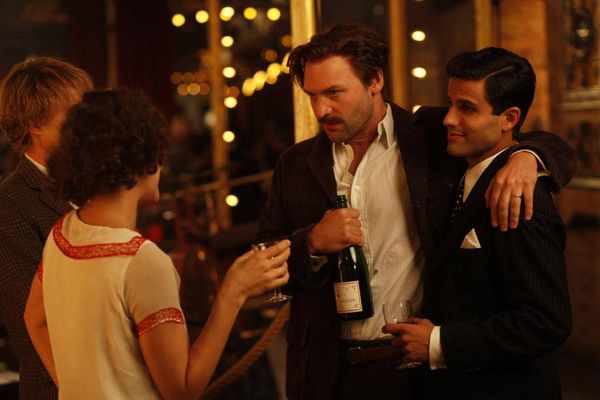Eye For Film >> Movies >> Midnight In Paris (2011) Film Review

A cacophony of Woody Allen sycophants have proclaimed nearly every film he's made since Match Point as his return to form. For anyone who's seen and loved his output from the Seventies and Eighties, this is clearly utter rubbish, but Midnight in Paris may well be the film that changes everything. After such a long run of misfires, and voices vaulting his last 15-years worth of films to be something they're not, it was hard to believe that this day would come.
Beginning in a Paris restaurant, we meet Gill Pender (Owen Wilson) a failing novelist, struggling to get positive feedback for his recently completed manuscript. His fiancée Inez (Rachel McAdams) is beginning to lose patience, and asks her old university professor Paul (Michael Sheen) to read through the piece to shape it into something worthwhile. One evening, Gill cuts loose from his group of friends and finds himself alone in a quiet backstreet. A nearby clock strikes midnight, and a 1920s-style car arrives.

He's then transported into a Paris of the 1920s. The car takes him to a party where he meets F Scott Fitzgerald (man of the moment Tom Hiddlestone) and his wife Zelda (Alison Pill). They introduce him to Hemingway (Corey Stoll), who then introduces him to Gertrude Stein (Kathy Bates), and so on. In time Gill's novel gets read, and Gill gets the best perspective of life, art and literary reputation as one could ever hope for.
Firstly, it's good to hear Woody Allen writing for mainly American voices and actors again. He doesn't have the ear for the rhythms and intonation of anyone else (most specifically, anyone else but New York intellectuals). It's something that really benefits the performances – if you can remember Naomi Watts' straining to do a British accent, spooling off Allen's New Yorkite dialogue in You Will Meet a Tall Dark Stranger, you will also be supremely glad.
Secondly, the movie harks back to his light fantasy comedies of the eighties such as Zelig or The Purple Rose Of Cairo, where Allen also fared well. Allen does this high-concept stuff amazingly well – it's light as a feather but pleasingly naïve in its hopelessly nostalgic look at a time. This wallowing in nostalgia helps him create a world away from 21st century Paris – also great as this means he can get away from some critics' accusations of him feeling out of touch.
But, most of all, the film is incredibly engaging. Owen Wilson is the most likeable he's been for a long time, and provides an excellent guide through the streets of an imagined Twenties Paris, which encompasses everything from the can-can to drinking tea with Salvador Dali (in a fun turn from Adrien Brody) in a café. The beautiful visuals, the accordions on the soundtrack and the catalogue of hilarious cameos round it off to make this a heady experience.
It's completely insubstantial but Midnight In Paris is effortlessly entertaining, infinitely likeable and surprisingly warm – this is a real treat for Woody Allen fans. A small miracle.
Reviewed on: 07 Feb 2012



















